Secondary Plant Compounds
All information about "Secondary Plant Compounds" and the related magazine articles can be found here.
Our articles are written clearly and link to scientific studies where relevant. This is how we meet our own standards: we regularly deliver new, high-quality content for you—free of charge, no sign-up required, with the highest possible benefit to you.
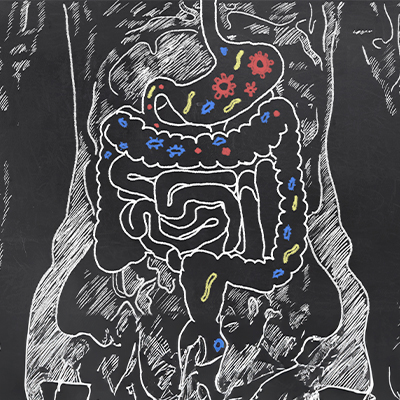
All you need to know about gut health
Intestinal health not only affects digestion, but also your overall wellbeing. Find out more now.
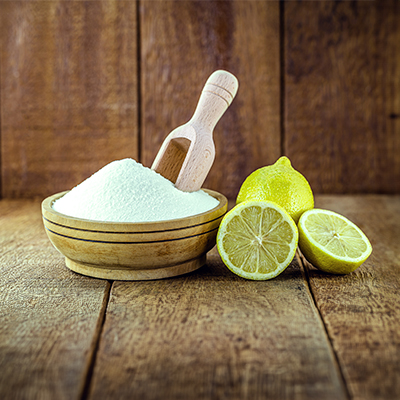
Home remedies for heartburn
Burning, heartburn, pain: almost everyone is familiar with heartburn. Taking a look at your lifestyle and diet can help manage the symptoms. Find out now how you can get relief in just a few steps!

Glycine regenerates body and mind
As an important amino acid, glycine is involved in many processes in the body and can have a positive effect on both physical and mental health. Muscles, skin, stress and psyche: find out more about the extensive areas of application and effects of this amino acid here.

How to recognise the symptoms of a vitamin deficiency
Permanent tiredness, mood swings, digestive problems and hair loss - vitamin deficiency can manifest itself in many unspecific symptoms. Find out which ones you shouldn't ignore.
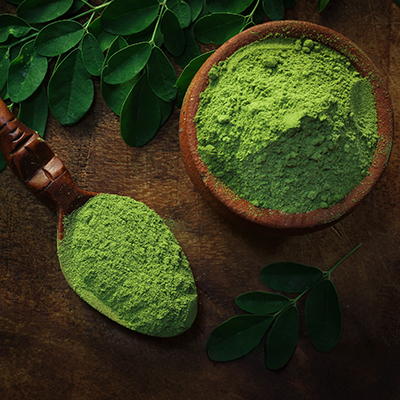
Is Moringa a real "superfood"?
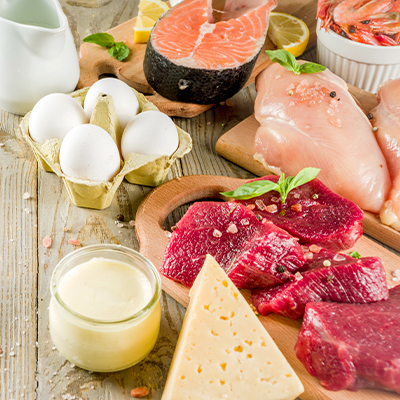
This is how versatile the micronutrient choline is in the body
The vitaminoid is a real all-rounder & is used in many places in the body as a cell building block. A deficiency has major health implications.

Omega 3 for your skin, heart and brain
Omega-3 fatty acids are found in some foods, including fish. If you have an unbalanced or vegetarian diet, omega-3 capsules are a sensible alternative to ensure you get enough of the fatty acid. Find out more about the many benefits of an optimal omega-3 intake and how a deficiency can become apparent.
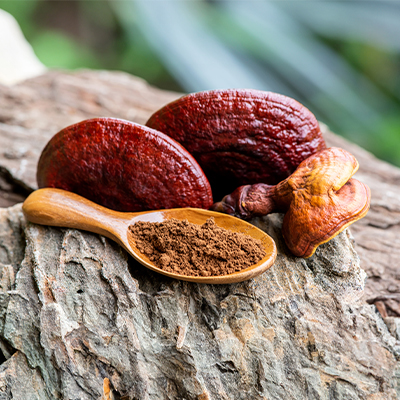
Reishi - a medicinal mushroom with thousands of years of tradition
What makes Reishi so special? Reishi has a long history in Traditional Chinese Medicine (TCM) and is now gaining popularity worldwide as a medicinal mushroom with positive health effects. Find out more about its many uses, the scientific research and the potential benefits attributed to it.

How L-carnitine works in energy metabolism
Carnitine is mainly found in animal foods and plays an important role in energy metabolism. Find out more now.

These are the causes of hair loss
There are many different types of hair loss in men and women - and there are different ways to help your hair grow back. Find out more now.

Vitamin K2 for bones and cardiovascular health
A vitamin K2 deficiency is associated with osteoporosis and arteriosclerosis. Here you can find out more about this important vitamin, its function in calcium metabolism and what you should definitely bear in mind when taking a supplement.
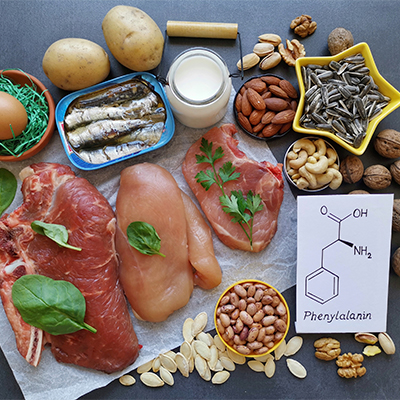
The body needs phenylalanine for this
The amino acid phenylalanine is required for the synthesis of dopamine and serotonin and is also an important building block for proteins. Find out more now.
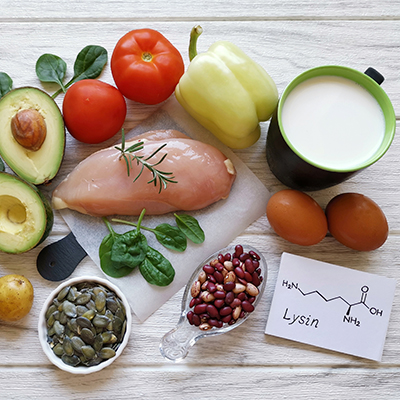
The essential amino acid lysine
From the metabolism to the immune system to the skin: there are many processes in the body in which lysine is involved. A deficiency of the essential amino acid can therefore disrupt these processes. The good news is that lysine is found in many foods. Find out more in this articel!

Your nutritional timetable for pregnancy
The right diet is particularly important during pregnancy to ensure that the expectant mother and, above all, the baby are adequately supplied with all the important nutrients. Because nutrition can influence the baby's development! Valuable answers and tips can be found here.
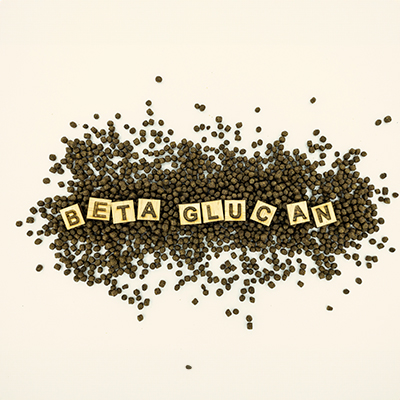
The importance of beta-glucan for the body
Good for the gut and the immune system? Fibre is said to have a number of health-promoting properties and effects. We have summarised these for you in this article.
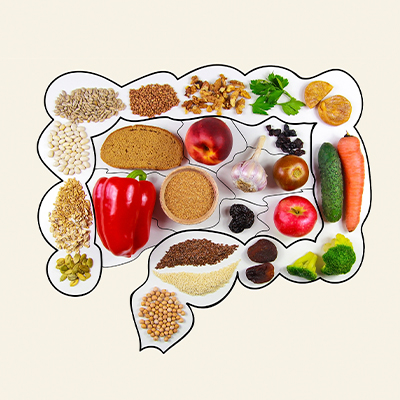
Propionic acid - why we need vegetables for this
Everyone has heard that fibre is important for our health, but do you know why? Did you know that vegetables and pulses form propionic acid in our gut? But what is it good for? Find out more here!

Selenium - effect, deficiency and overdose!
The trace element selenium, which is essential for us, plays a supporting role throughout the body - whether in numerous metabolic processes or a healthy thyroid gland. However, the low content of selenium in our food is often not enough to ensure an adequate supply. What exciting findings have scientists made with it in research and how is it linked to Hashimoto's? Selenium deficiency or overdose - how bad is it in each case? Read more about it here!
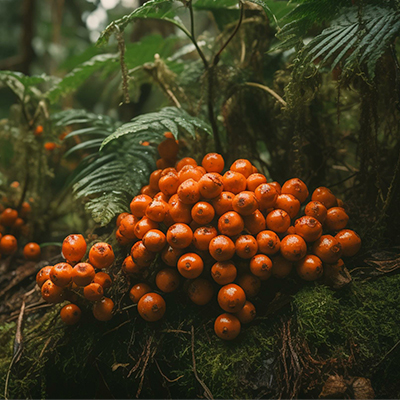
Guarana - a good coffee alternative?
Is guarana a real alternative to your morning cup of coffee? The extract from the superfruit from the tropics is becoming increasingly popular as an additive for drinks and as a supplement.

All you need to know about caffeine tablets
Caffeine tablets are a convenient and fast-acting way to get the energy boost of caffeine without drinking a cup of coffee or other caffeinated beverages. Find out more now.
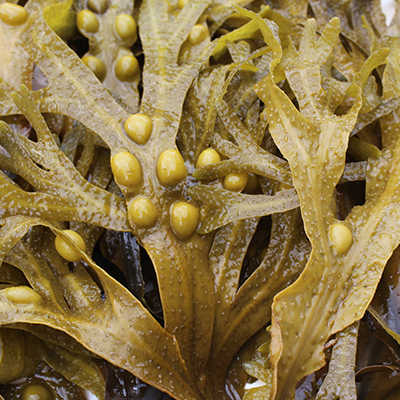
Brown algae - nutrients and vitamins from the sea
Inconspicuous and widely underestimated: brown algae are not only tasty as food, but also a good way to support your body as a dietary supplement. Find out everything you need to know about the benefits of these algae here.
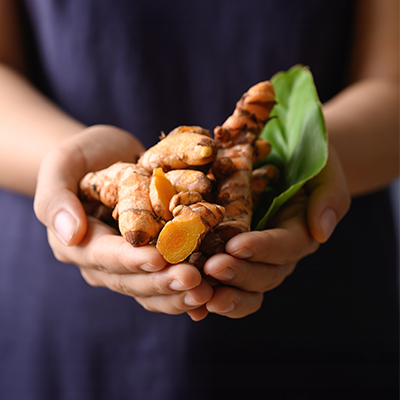
Turmeric - more than just a spice
Turmeric is still very popular today. What is the truth behind the phenomenal effects attributed to this yellow tuber?

The underrated power of folate: Why this vitamin is so important

B6 - a vitamin with many tasks!
The water-soluble vitamin cannot be stored by the body, but is extremely important for us! It is essential for metabolic processes, nerve transmission, hormone production, the immune system and also for regulating homocysteine levels! But despite a balanced diet, are you at risk of vitamin B6 deficiency? Maybe it's due to the contraceptive pill! Read more about this here!

Why is methylsulfonylmethane (MSM) so important to us?
An adequate supply of sulphur is essential for the proper functioning of enzymes and amino acids. Here you can read about the benefits of MSM for our skin and hair, as well as for osteoarthritis, allergies and sports injuries.
Secondary plant substances: important for our health
Secondary plant compounds have only recently attracted the attention of science and the health industry. As their name suggests, phytochemicals are found exclusively in plants and are known to provide numerous health benefits that go beyond the basics provided by our usual nutrients.
But what exactly are phytochemicals and how can they positively influence our well-being? We answer these and other questions about phytochemicals in this article.
What are secondary plant substances?
Secondary plant substances, also known as phytonutrients, are chemical compounds produced by plants. In contrast to the primary plant substances, which are essential for the growth and development of the plant, secondary plant substances play a supporting role. For example, they serve as natural defense mechanisms against pests, UV radiation or other environmental influences.
These substances are not essential for the human body, but can still offer a variety of health benefits. The German Nutrition Society emphasizes the importance of these substances for a healthy diet and recommends consuming a variety of plant-based foods in order to benefit from the positive effects of phytochemicals [1].
What different plant substances are there?
Secondary plant substances can be divided into various groups that differ in their chemical structure and specific effects. This diversity enables them to offer a wide range of health benefits.
The best-known groups include:
Carotenoids: These colorants give fruit and vegetables their yellow, orange and red hues. Beta-carotene, a typical representative of this group, is found in carrots and pumpkins, for example. Carotenoids are not only important for plant pigmentation, but also play a role in human health by acting as antioxidants and can support eye health. [2]
Flavonoids: This group includes a variety of compounds found in almost all plants. They are known for their strong antioxidant effects and are found in high concentrations in berries, citrus fruits and green tea. Flavonoids also contribute to cardiovascular health by improving blood vessel function and exhibiting anti-inflammatory properties. [3]
Polyphenols: This group includes a variety of compounds found in fruits, vegetables, nuts and beverages such as coffee and red wine. They are known for their antioxidant and anti-inflammatory properties, which can help reduce the risk of chronic diseases [4]. Polyphenols can also positively influence the microbiota in the gut, which in turn has an effect on the immune system.
Glucosinolates: These sulphur-containing compounds are typical of cruciferous vegetables such as broccoli, cabbage and Brussels sprouts. They give these vegetables their characteristic, slightly bitter taste. When consumed, glucosinolates can be converted into biologically active compounds that can reduce the risk of cancer and promote detoxification processes in the body [5].
Essential oils: These volatile compounds are responsible for the fragrance and flavor of many herbs and spices. In addition to their sensory properties, they also have potential health benefits as they can have antimicrobial and anti-inflammatory properties. [6]
Saponins: These compounds are found in legumes and some vegetables. They can reduce cholesterol absorption in the intestine and possibly protect against certain types of cancer. [7]
Phytoestrogens: These plant compounds are similar in structure to human oestrogen. They are mainly found in soy products and flaxseed and may influence the risk of hormone-dependent cancers [8].
Sulphides: These sulphur-containing compounds are mainly found in garlic and onions. They may have antibacterial properties and may reduce the risk of cardiovascular disease. [9]
Chlorophyll: The green pigment in plants has antioxidant properties and may help detoxify the body. [10]
Are phytosterols secondary plant substances?
Yes, phytosterols are secondary plant substances. They even deserve special attention, as they can play an important role in lowering cholesterol levels.
Phytosterols, also known as plant sterols, are very similar to cholesterol in their chemical structure. This similarity is the key to their cholesterol-lowering effect. When you eat foods containing phytosterols, they compete with cholesterol in the intestine for absorption into the body. As phytosterols are less well absorbed by the body than cholesterol, this leads to reduced cholesterol absorption. [11]
Phytosterols occur naturally in many plant foods, especially in:
- Vegetable oils (e.g. sunflower oil, rapeseed oil)
- Nuts and seeds
- Wholegrain products
- Legumes
- Fruit and vegetables
In recent years, the food industry has also started to enrich certain products with phytosterols to increase their cholesterol-lowering effect. For example, you can find margarine or yogurt drinks with added phytosterols in the supermarket. The cholesterol-lowering effect of phytosterols is scientifically well documented. But beware: according to one study, excessive phytosterol levels can lead to an increase in the risk of heart attack in coronary heart patients [12].
Health-promoting effect of phytochemicals
Although phytochemicals are often only found in small quantities in our food, they can have a significant impact on our health:
Antioxidant effect: Many phytochemicals act as antioxidants. This means that they can neutralize free radicals, which can otherwise cause cell damage and contribute to premature ageing and various diseases [13].
Anti-inflammatory properties: Some phytonutrients can reduce inflammatory processes in the body. This is particularly important as chronic inflammation is associated with many diseases.
- Cancer prevention: Certain phytonutrients may be able to reduce the risk of various types of cancer.
- Cardiovascular protection: Some phytonutrients can lower cholesterol levels, regulate blood pressure and thus reduce the risk of cardiovascular disease.
- Support of the immune system: Certain phytonutrients can strengthen the function of our immune system and thus better protect us against infections.
- Protection against UV radiation: Some phytonutrients, in particular certain carotenoids, can provide natural protection against harmful UV radiation.
How to make the most of phytochemicals for your health
To prevent health risks and benefit as much as possible from the positive effects of phytochemicals, we have a few tips for you:
Eat colorful food: Different colors of fruit and vegetables often represent different phytochemicals. Red tomatoes, for example, contain lycopene, while green broccoli is rich in glucosinolates. The more colorful your plate, the more diverse the phytonutrients.
- Eat seasonally: Fruit and vegetables that are harvested at the right time of year often contain more phytonutrients.
- Gentle preparation: Many phytonutrients are sensitive to heat. Steaming or briefly sautéing can help to preserve more of these valuable compounds.
- Don't peel: In many types of fruit and vegetables, the phytochemicals are located directly under the skin. If possible, eat the peel as well.
Combine wisely: Some phytochemicals are better absorbed by the body when they are combined with certain other nutrients. For example, beta-carotene is better absorbed when consumed together with some fat.
- Go for whole grains: whole grain products contain more phytochemicals than highly processed grain products.
- Don't forget herbs and spices: these are also rich in phytochemicals and can enhance your meals not only in terms of taste but also in terms of health.
Superfoods and phytochemicals
Superfoods have attracted a lot of attention in recent years, and not without good reason. These special foods are rich in phytochemicals that have a variety of health-promoting properties. Among the best-known representatives are goji berries, acai, matcha tea and chia seeds, all of which have impressive bioactive compounds.
Goji berries are an excellent example: they contain high amounts of carotenoids, especially zeaxanthin, which is important for the health of our eyes. Acai berries also stand out as they are rich in anthocyanins - a group of flavonoids that have strong antioxidant properties and can therefore contribute to cell health. Matcha tea impresses with its high content of catechins, in particular epigallocatechin gallate (EGCG), which is known for its potential anti-cancer properties [14]. Chia seeds, on the other hand, contain lignans, which have estrogenic effects and may reduce the risk of hormone-dependent cancers. The miracle tree moringa is also a popular superfood [15].
How many phytochemicals do humans need?
There is no specific, universally valid recommendation for the daily intake of phytochemicals. The reason for this is that there is a wide variety of these compounds and their effects are complex and often synergistic. Instead, nutrition experts generally recommend following a varied and plant-based diet to benefit from the health benefits of phytochemicals.
Secondary plant substances - little helpers with a big effect
Secondary plant substances are nature's true miracle cures. Although they are only found in small quantities in our food, they can have a significant impact on our health. From lowering cholesterol levels and protecting against free radicals to supporting our immune system: the positive effects of these plant compounds are manifold and should not be ignored.
Secondary plant substances work best as part of a balanced, plant-based diet. Individually isolated substances in the form of food supplements may not have the same effect as the naturally occurring compounds in food.
The message is therefore clear: a diet rich in fruit, vegetables, wholegrain products, nuts and pulses not only prevents vitamin deficiency and provides important minerals, but also a wealth of health-promoting secondary plant substances.
By enriching your diet with a variety of plant-based foods, you are doing something good for your body and investing in your long-term health. Secondary plant substances may be small, but their effect is huge. They are another good reason to put more plants on our plates: cheers to the power of nature!
Sources
[1] https://www.dge.de/wissenschaft/fachinformationen/sekundaere-pflanzenstoffe-und-die-gesundheit/[2] https://www.studysmarter.de/studium/lebensmittelwissenschaften/naehrstoffe-lebensmittelwissenschaften/carotinoide/
[3] https://www.spektrum.de/news/flavonoide-sekundaere-pflanzenstoffe-schuetzen-die-blutgefaesse/2243404
[4] https://pubmed.ncbi.nlm.nih.gov/33477894/
[5] https://pubmed.ncbi.nlm.nih.gov/33456268/
[6] https://meingesundheitstest.de/aetherische-oele-gegen-chronische-entzuendungen/
[7] https://www.bdc.de/warum-sekundaere-pflanzenstoffe-vor-krebs-schuetzen-koennen/
[8] https://pubmed.ncbi.nlm.nih.gov/36753952/
[9] https://www.verbraucherservice-bayern.de/themen/ernaehrung/sulfide-eine-gruppe-der-sekundaeren-pflanzenstoffe
[10] https://lpi.oregonstate.edu/mic/dietary-factors/phytochemicals/chlorophyll-metallo-chlorophyll-derivatives
[11] https://www.medmedia.at/apotheker-krone/phytosterine-natuerliche-optimierung-der-blutfette/
[12] https://www.imd-berlin.de/spezielle-kompetenzen/nahrungsmittelshyunvertraeglichkeiten/phytosterin-resorption
[13] https://www.bzfe.de/ernaehrung/ernaehrungswissen/essen-und-wissen/sekundaere-pflanzenstoffe/
[14] https://pubmed.ncbi.nlm.nih.gov/32660101/
[15] https://www.vitalstoff-lexikon.de/Sekundaere-Pflanzenstoffe/nbspLignane/Interaktionen
